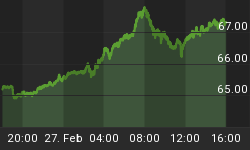Answer: both were quoted in the keynote speech last week by U.S. Commodity Futures Trading Commission (CFTC) commissioner Scott O'Malia, at the 13th Annual Energy and Commodities Conference in Houston.
Referencing pop culture in a speech on derivatives is a little unorthodox. But what O'Malia was describing to conference attendees was even more so.
The commissioner was discussing the CFTC's implementation of the Dodd-Frank Act. Otherwise known as the financial reform rules in the U.S.
A major thrust of Dodd-Frank has been the regulation of derivatives. Options, futures, swaps and other such instruments that are seen as being a large and potentially risky part of the financial infrastructure.
And the U.S. government and financial institutions have been working frantically since the financial crash to implement new rules to make derivatives trade safer. As O'Malia put it, "I've given up rolling up my sleeves and have just about torn them off."
But much of this work is now coming to fruition. There have been a whirlwind series of meetings, speeches and seminars on proposed derivatives rules over the last several weeks in the U.S. The market is bracing for big changes.
And those changes are arriving. Today CME Group (owners of a good chunk of American trading platforms, including NYMEX and COMEX), announced that it has officially begun clearing of over-the-counter interest rate swaps.
Clearing of swaps is a priority item under the new rules. Basically this means when these derivatives are traded between two parties, the trade must be executed through a central, independent agent (much like a stock exchange does). Buyers and sellers are no longer allowed to do business directly with each other.
There are several reasons lawmakers pushed for greater clearing of derivatives. It standardizes the market. And provides some degree of insurance if trades go bad.
But one of the main stated reasons for the move is price discovery. By having one (or perhaps a few) central exchanges looking at all derivatives trades, government and regulatory bodies will be able to gather data on going prices, volumes and other metrics. In the past, such information was very hard to gather.
The result being, derivatives markets are going to get a lot more transparent.
Ultimately, this is a good thing. But the transition may be rocky. As I've discussed previously, price discovery can provide some unpleasant surprises.
Up until this point, there has been little data on the market value of many derivatives. Meaning that owners of such instruments probably had some leeway in reporting the value of their derivatives holdings.
That leeway is now disappearing. Clearing of derivatives will provide hard data on prices. It's likely that holders will be forced to use such pricing for reporting purposes.
What do you want to bet that someone somewhere has been keeping derivatives on the books at inflated prices in order to beef up their financials? For any such groups, clearing and price discovery could lead to some significant write-downs. The kind that lead to the last crash, after the introduction of mark-to-market accounting rules.
This is a critical development. We'll be keeping an eye out for any warning signs over the coming months.
Here's to clearing things up.
Source: http://oilprice.com/Finance/the-markets/What-Do-Katy-Perry-and-Eminem-Have-in-Common.html
By Dave Forest for OilPrice.com who focus on finance and commodity news and who specialize in http://www.oilprice.com" oil price forecasting. You can also find the latest oil prices and a free geopolitical newsletter. Visit http://www.oilprice.com















